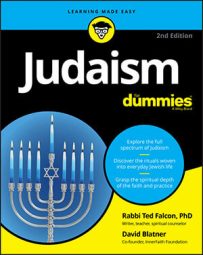In Judaism, kosher almost exclusively relates to food: what Jews are and are not allowed to eat. The word kosher, however, is so well known that it’s become part of the common English language, meaning something that’s allowed, legal, or proper.
The Jewish dietary laws are called kashrut, and they’re so complex that whole volumes have been written on them. However, they more or less boil down to these rules:
Animals with cloven hooves that chew their cud are kosher, including cattle, sheep, goats, and deer. Other, mammals, like pigs, camels, and hares aren’t kosher (called trayf, from the Hebrew word terayfa, meaning “torn”). Not only are they not to be eaten by Jews, but no products which derive from them are kosher.
Certain procedures must be followed to ensure a humane slaughter. For example, the animal’s throat must be cut by a trained ritual slaughterer (called a shochet), using a single slice of an extremely sharp knife that has no nicks.
Certain parts of animals aren’t kosher, such as the sciatic nerve in the hindquarters. Unfortunately, not only are these parts difficult to remove, they also include some of the choicest cuts, which is why it’s rare to find kosher filet mignon, rump and sirloin steaks, leg of lamb, or London broil.
Animals that are diseased or have physically flawed organs are trayf. When the lungs of animals are examined for irregularities, and none are found, the animal is considered glatt (“smooth”). If there is any question about the quality of the meat, even if it proves to be just fine (kosher), it isn’t considered glatt kosher.
Seafood is kosher as long as it has fins and scales. Shellfish like lobsters, oysters, shrimp, octopus, clams, and crabs are forbidden. Some fish, like swordfish and sturgeon, have scales that are questionable, so they’re usually considered trayf.
Domesticated fowl — chicken, turkey, quail, Cornish hens, doves, geese, duck, and pheasant — are kosher and Jews may eat them, but birds of prey (like eagles and hawks) are trayf.
All reptiles, insects, and amphibians are trayf. Note that some food additives and colorings are made from insects, so those items are prohibited, too.
The blood of any animal is trayf, so kosher meat (except for fish) has to be kashered (made kosher) by draining the blood and washing and salting the meat. Kosher meat is always cooked well done so that no pink is left.
The kashrut laws expand the biblical prohibition against cooking an animal in its mother’s milk to eating any dairy and meat together. Jews can’t put dairy foods and meat on the same plate, or even eat them during the same meal (even a tiny amount of one or the other).
So, cheeseburgers — or even a regular burger with a milkshake — are out. Generally, Jews wait several hours after a meat meal (called fleishig) before eating dairy (called milchig), and vice versa. Fowl, like chicken, was once exempted from this law (because they don’t give milk), but long ago, rabbis decided that you can’t mix fowl and dairy either. Fish is completely exempt from this rule.
Food that isn’t meat or dairy — including every fruit, vegetable, herb, grain, fungus, nut, root, soy product, or whatever — is pareve (parv or par-ev) and is neutral. That is, you can eat it with either meat or dairy. Eggs are also pareve (though if an egg has a blood spot in it, it’s considered trayf).
Products made from grapes (juice or wine) must be monitored and authorized as kosher by a rabbi.
The kosher status of food can be transferred to utensils or dishes (except for glass). So traditional Jews have at least two sets of dishes — one for milk, and one for meat — as well as two or more sets of utensils, ovens, and washing bins.
Because additional kosher laws apply during Passover, some families own a third (or fourth) set of dishes. Fortunately, there are various ways to kasher (make kosher) metal utensils and pots.
Kashrut laws extend to any item that Jews eat, or that touches the food that Jews eat, so you might even hear about kosher aluminum foil or plastic bags that ensure that the manufacturer only used kosher organic oils in the process of pressing the foil or making the bags.
Similarly, most hard cheeses contain rennet, which is often obtained from the stomach linings of non-kosher animals, making the whole cheese non-kosher.

